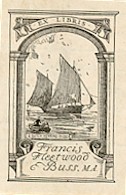The Buss StoryIndex Author's
Notes
|
There is a quaint but compelling story told by Dr Henry Buss about the family's origins, no matter that we have little hope of ever verifying the details!
The year 1698 was a year of great disruption in English social life. King James II, a Roman Catholic, was threatening to build a royal despotism backed by a powerful army. But his overthrow, greatly assisted by Anglican gentry and the church of England, led to the James' elder sister, Mary, and her husband William, being brought over from Holland to become King and Queen. They were required to accept a limitation of their royal powers as outlined in the Declaration of Rights. Soon after this all Nonconformists (with the exception of the Unitarians - who rejected the Trinity) were granted freedom of worship by the Toleration Act of 1689.
William stepped ashore in England with some difficulty. He was a short man with stooped shoulders; an asthmatic with a consumptive cough. His face, deeply lined from the constant pain he endured, bore a large beaked nose and when he smiled he bared his bad teeth. In his retinue would be doctors and nurses whose sole task was to care for the King. Amongst them came a certain Mrs Buss who, according to Dr Henry Buss, would become nurse to the Princess Anne, afterwards Queen. William was dedicated advocate of Tolerance and on April 11th, 1689 was crowned King of England, Scotland, France, and Ireland, Defender of the Faith
In due course this Mrs Buss, her children and grandchildren remained in England settling chiefly in the area of Kent. One of these was the father of a certain Robert Buss, a well educated young man who lived in the village of Bromley in Kent about the year 1775.
ACCOUNT BY FRANCIS FLEETWOOD BUSS
Francis Fleetwood Buss, writing in 1937, has a different account of origins. Here are his words:
The Buss family, to the best of my belief, took its origin in Flanders. Aunt Mary, while residing at Tunbridge Wells, heard that a family of weavers bearing the name of Busse migrated to England from the Low Countries and settled in East Kent where the name is to be found to this day.
He writes further that when he lived in Hastings (Kent) from 1928-31 the "Directory" gave the addresses of no fewer than six Buss families "which I also noticed at Brightling".
From the registers of the Brassey Institute the name seems to grow more frequent towards the Kentish borders.
Extract from a letter of Aunt Mary dated September 29th, 1915 (cited by Frank):
"In August I was staying at a quaint village twelve miles from Tunbridge Wells. I heard that when the Flemings first came to England, many of them settled in Kent. Among those who settled ay Goudhurst was a family named Buss. They were cloth-workers, made money .... Many of them lie in the church yard & several families still remain."
Even in Frank's days there were avid Buss researchers and he adds that "several members of the Buss family have made enquiries at Goudhurst, but without being able to establish any family connection". He continues:
... it is found in the Church-yard at Goudhurst and in the Church Registers at Staplehurst. I have myself encountered the name in Germany spelt with a final 'e', and my daughter has recently (1936) come across an American family, probably of Dutch origin, bearing the same name, viz: Busse.
The reference to the Staplehurst registers are significant. The year is 1632, and on January 6th a William Buss had his daughter christened Sarah. We cannot know how old she was, perhaps a mere baby, for a short while later, on January 14th, the registers record the child's burial!
Having given his own account of family origins Frank cites the account by Henry Buss (above) and gives us this evaluation.
On this theory I would remark that according to Miss Strickland's "Lives of the Queens" the head Nurse of the Princess Anne's establishment seems to have been a Quakeress, a Mrs Pack, who nursed the Duke of Gloucester. I believe that a certain Mrs Buss is also mentioned, but there is no evidence to show that she founded a family in England. Moreover, in the 17th Century the title of Mrs. was frequently given to an unmarried woman. There is an instance in Winchester Cathedral of a female child of three months old being buried under the title of Mrs.
On the whole I should say that what scanty evidence there is as to the origin or our family points to the Low Countries.
To this I would add, that even if there was a Mrs Buss who came to England with William and Mary, the name of Buss was already established in Kent 70 years before that. The origins remain a mystery.
| Frank noted: "There
is also a small Dutch fishing boat known as a
"Buss".
These
"herring-busses" were square rigged
craft, wont to leave Dutch ports, to fish of the
Scotch (sic) coast. They were
"Drifters" which lowered all but their
mizzen when ...... to their nets." It appears that Frank drew this design himself as a plate to paste in the front of all his books (right). See also this picture and description. It would probably be quite surprising if more recent enquiries in Kent brought up anything new. But the effort continues. |
|

